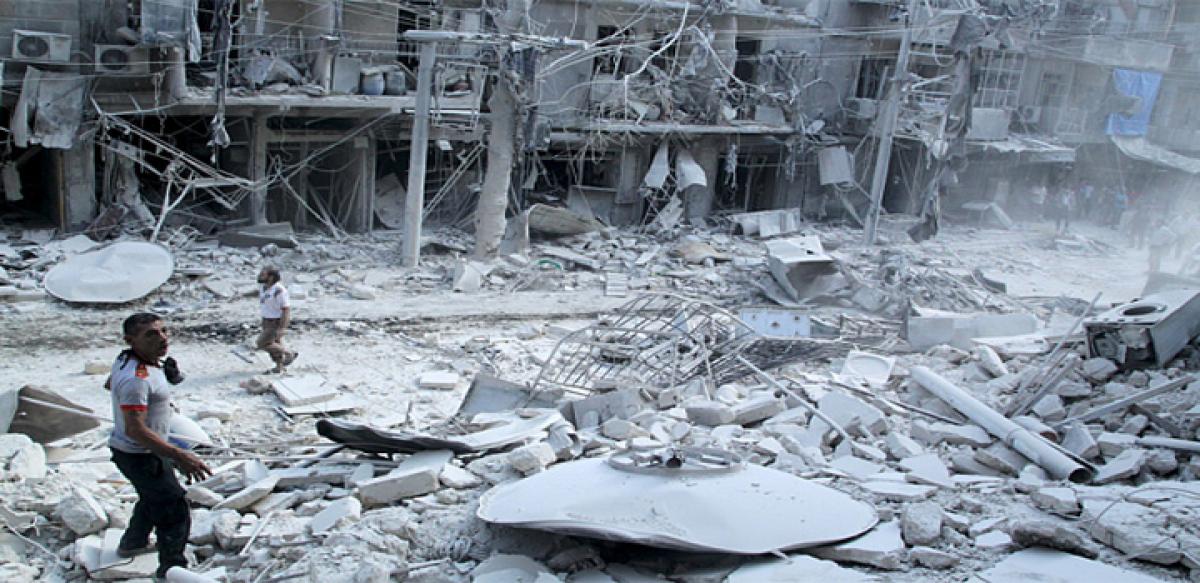Live
- Celebrating the power of communication
- Standing at work can actually be detrimental to BP
- Adani US bribery case reaches SC
- Prez, PM to address special event to mark Constitution Day
- I owe every film of mine to Vijay Sethupathi: Eashvar Karthic
- Achoo! City faces spike in flu, cold, cough cases
- CPM demands TTD to allocate Rs 100 cr every year for Tirupati development
- Oppn pushes for debate on Adani issue, Manipur
- Guv invites Soren to form govt
- Mahayuti allies go into huddle to pick Maha CM
Just In

Even as the UN-mandated peace negotiators were meeting to prolong the hard-won truce in the five-year bloody Syrian war, came the communiqué to the Geneva conference on Monday of Russia’s decision to pull out its troops from Syria.
Even as the UN-mandated peace negotiators were meeting to prolong the hard-won truce in the five-year bloody Syrian war, came the communiqué to the Geneva conference on Monday of Russia’s decision to pull out its troops from Syria.
Putin doesn’t seem to cease to surprise the West. Six months ago, his entry into Syria to prop up the Bashar al-Assad regime in a bid to fend off Islamic State terrorists caught the West unawares.
Due to cessation of hostilities since February 27 by the Syrian forces and the rebels, for the first time peace is visible. Over 5 lakh perished in the last five years, and many times more were injured in the conflagration to dislodge Assad since the Arab Spring.
The Syrian situation turned into one of a complex war since 2011, with Russia and Iran standing by Assad. For Russia, post Soviet Union, both Syria and Iran have been strategic allies and close trading partners.
The US was in, largely to pursue containment of the staunch anti-Israel Shias in West Asia – Iran, Syria, Hezbollah and Hamas – who are also enemies of its other close ally, Saudi Arabia. Thus, geopolitics have been keeping the Syrian conflict raging.
The US, the EU and the Arabs were almost close to toppling Assad a few months ago, when Russia directly entered the scene and tilted the scales. It insists on peace sans any regime change.
However, the Geneva talks have the UN mandate to strive for a new transitional government and a new constitution to pave way for presidential polls within 18 months. Of late, there is even a talk of federal division of Syria between the Sunni allies backed by Saudis and the Alawite sect of Shias led by Assad.
In the recent months, the EU got jittery over huge and unending influx of fleeing millions from Syria and Iraq. Turkey too got wary as Syrian Kurds, backed by the US, want autonomous region comprising parts of Turkey also. Thus, everybody seemed to have a stake in the Syrian peace, and the UN efforts gathered pace in the last quarter of 2015.
One reason for the sudden pullback of the Russians could be their debilitating finances both due to sanctions and low oil prices. Their exit was also timely to avoid confrontation with the Saudis who are preparing forces from 20 nations to land in Syria any time.
At last, both major powers, the equal guarantors for cessation, are rightly pushing peace efforts, and hopes are rising for the Syrians. Else, as UN mediator Staffan de Mistura warns, the failure of talks would mean a “return to war worse than we had before.”
With the Russians withdrawing their forces, the obligation falls on the international community, to be precise, the United Nations to ensure that the vacuum is not filled by forces inimical to peace in Syria.
Hope the West does not revive its efforts to topple Bashar al-Assad regime that would only destabilise the region. With the exit of Russians, the pressure should mount on Turkey and other pro-Western Arab powers to leave the fate of Syria to its own people. Such a course would facilitate the peace process.

© 2024 Hyderabad Media House Limited/The Hans India. All rights reserved. Powered by hocalwire.com







